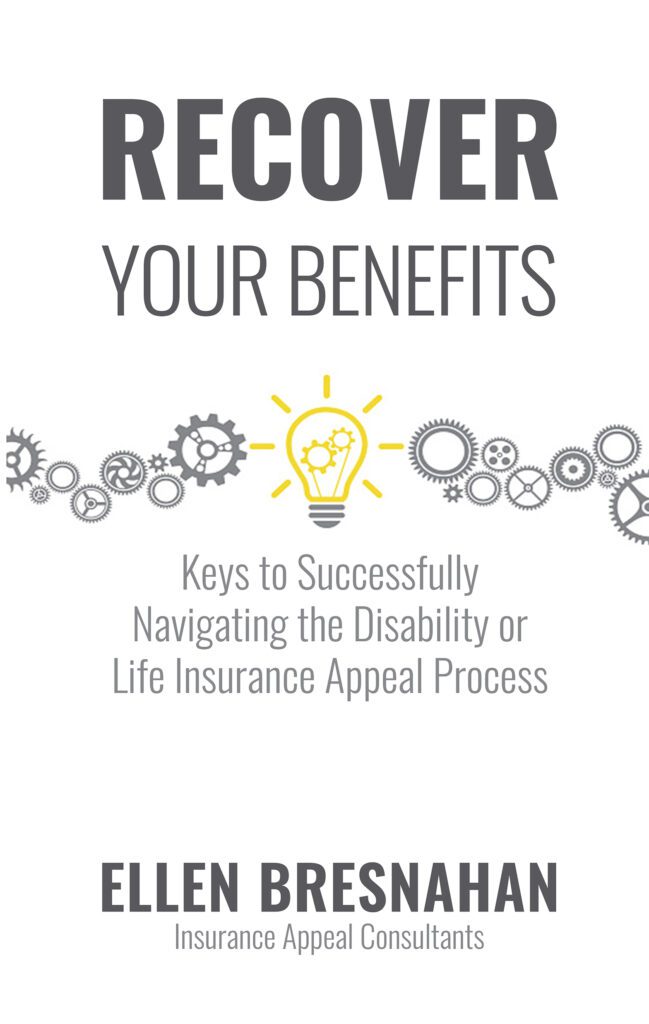Long Term Disability | Short Term Disability
Expert Guidance for DISABILITY Appeal Success
Free Denial Letter ReviewStrategy + Support = Success
Disability Insurance claim denied? Help starts here.
When a disability insurance denial turns your world upside down, Insurance Appeal Consultants can help you develop a winning appeal.
Start with our two free resources to understand exactly what you’re dealing with:
- Download our free guide, Recover Your Benefits: Keys to Successfully Navigating the Disability or Life Insurance Appeal Process to learn what really matters when building an appeal, and
- Get a free denial letter review to understand what you and your doctors will need to do to fight back against the insurance company.
Appeals are time-limited, so don’t delay. Let Insurance Appeal Consultants help you take the next steps towards a strong and successful disability insurance appeal today.


Free Guide to Disability Insurance Appeals
A denial letter catches most people off guard, and comes at the worst possible time. Building a successful appeal can be overwhelming. Our free disability insurance appeal guide, Recover Your Benefits: Keys to Successfully Navigating the Disability or Life Insurance Appeal Process, will walk you through the important steps, from identifying the real reason(s) your claim was denied, to planning an effective response, to keeping your appeal supported through the insurance company’s review period.
The insurance company is counting on you being overwhelmed and giving up, especially if you have been told your short-term disability claim is “too small” to hire a representative. Give our comprehensive free guide a try first – with some knowledge, patience and preparation, it IS possible to build a winning appeal.
Personalized Disability Insurance Appeal Assistance - You Have Options
Our free resources may be all you need, but for hands-on, personalized help specific to your claim, a Disability Appeal Planning Session will jump start your disability insurance appeal. After we review your denial letter, we’ll walk you through our report in an Appeal Planning Session call. Together, we’ll discuss our feedback from the denial letter review, analyze what went wrong with your claim, and plan your strongest appeal. Next, we’ll take what we’ve learned and develop an initial draft of your appeal letter. We’ll identify what to dispute (and what to ignore), and what additional evidence you and your doctors will need to add to complete your appeal.
A one-time Disability Appeal Planning Session is right for you if:
- You have a disability or life insurance denial letter and are not sure where to even start for an appeal
- You have your appeal planned out, but also have questions and would feel a lot better running them by an experienced consultant who can see things you’re missing
- You understand why your claim was denied, but are not sure how to develop the evidence you need for an appeal
- Your doctor(s) won’t do appeal paperwork or won’t support your claim and you want to brainstorm alternatives
- You’d like to jump start your appeal with an appeal letter template, customized to your claim, to guide you
Want more help? Appeal Coaching continues our personalized guidance and support throughout the entire appeal process. We’ll help you polish your final appeal letter, review the additional evidence you plan to submit, and suggest important additional context for your appeal. We’ll also help you respond to letters the insurance company sends as they evaluate the appeal.
Appeal Management means never having to deal directly with the insurance company again throughout the appeal process. We’ll act as your authorized representative and take charge of all aspects of the appeal, including writing and submitting everything. The only thing we can’t do is visit your doctor for you.
For Attorneys - Join Our Resource Network
Whether you handle the occasional ERISA appeal, or count disability and life insurance appeals as a dedicated practice area, the hard truth is that many cases do not fit your guidelines for representation. Particularly when disability denials are for only a few months of benefits, contingent fee representation often does not make sense for you, and paying by the hour does not make sense for your client (who could easily end up paying more in fees than their claim is worth). Or maybe you can’t take the case because an SSDI decision is pending, medical support for the claim has yet to be developed, or it’s unclear whether or not a short-term disability will become a long-term disability claim. But the appeal clock is ticking, and claimants can’t wait.
Insurance Appeal Consultants can help these clients develop successful appeals. We all recognize that no claim is ever “too small” for a person who was depending on their benefits. Importantly, by working with us, even if their appeal is denied our clients will have developed a detailed administrative record that puts them in the best possible position for moving forward with their claim. Often the same case that didn’t make sense for your appeal representation will be a perfect fit for your litigation expertise.
Read Our Article: For Attorneys – How to Lose Money by Winning a Disability Insurance Appeal.
Help us ensure that every claimant has the support and resources they need to successfully appeal a wrongful insurance denial. Contact Us to join our resource network today.
Quick Guide: Disability Insurance Appeal Strategies
DOs
Contact an experienced attorney
An experienced attorney will usually evaluate your case for free. If they are able to represent you for the appeal, they will explain the costs and benefits of contingent fee (“only pay if we win”) representation. Even if they are not able to represent you, understanding the reason why can help you know what steps to take next for your appeal.
You can find an experienced attorney by searching online, or Contact Us to ask for a recommendation from our appeal resource network.
Understand the specific reason(s) why your claim was denied
The denial letter should list all the information the insurance company reviewed, but there’s a catch: the information they reviewed may or may not have much to do with why a claim was denied. Keep reading past that “information we reviewed” section to find a paragraph or more that explains why the insurance company ultimately decided your claim was not supported. It could be as simple as a missing medical record or test result.
Take your time with the appeal
This is often your one and only chance to provide additional proof of your claim. If you send in a quick appeal asking the insurance company to review the same information a second time, you will almost certainly get the same result: claim denied. Only this time, you likely will not have a chance to respond, because most policies allow only one appeal. So don’t miss the deadline, but do take the time to make sure your appeal contains everything that you and your doctor(s) can provide to support your claim.
Add some new evidence for the insurance company to review
Once you understand the specific reason(s) why the insurance company denied your claim, it’s time to craft your appeal to show why the initial decision was wrong. The appeal must present more than just your opinion, though. Along with your appeal letter providing the context for your claim, you must include some new evidence (usually new medical records from additional office visits, test results, and/or a detailed explanation from your doctor explaining the limitations and restrictions that prevent you from working). Otherwise, it’s practically a sure thing that the same insurance company will review the same evidence and come to the same conclusion – claim denied.
DON’Ts
Don't give up on a valid claim
It’s hard to overstate how overwhelmed most people feel when they first open a denial letter. But do not let that stop you from doing everything you can to recover your benefits. The first steps to take are free: download our free guide explaining the appeal process, send us your denial letter for a free review, and contact an experienced attorney to evaluate your claim. Once you understand your options, reach out for any additional help you need to take the next steps forward with your appeal. You can do this!
Don’t ignore the actual policy language
Always request a copy of your policy from the benefit Plan Sponsor, which is normally your employer. The Plan Sponsor (not the insurance company) is required to give you a copy of policy and any other benefit “Plan documents.” Look for the specific definitions that apply to your claim, as well as any limitations and exclusions. The insurance company is arguing that the evidence you submitted so far did not prove you met these very specific definitions for coverage. You need to understand the specific language the insurance company is citing to appeal effectively. To complicate things further, the requirements for coverage usually change over the course of your claim, especially for a disability claim. Know what the policy says you needed to prove at the time your claim was denied.
Don't be the only voice presenting your medical evidence
The insurance company is set up to either agree or disagree with your doctor about your claim. They will likely have a doctor review your appeal, and their doctor needs to hear from your doctor about why you qualify for benefits. Your restrictions and limitations must also be noted in your medical records and supported by test or examination results.
Your appeal letter can highlight your medical records and give important context for your claim, but only your doctor can provide the test and exam results necessary to prove your claim.
Important: make sure your doctor also understands the current policy definitions that apply to your claim – you don’t want to have your doctor explain why the medical evidence shows you cannot do your job, for example, when the policy definition has shifted to being unable to perform any job.
Don’t miss the appeal deadline
If you are still waiting for additional evidence such as medical records or test results, send a letter to the insurance company explaining this, while also making it clear that you are appealing their decision to deny your benefits. Ask the insurance company to wait to decide the appeal until you can submit all the extra evidence they will need to fully and fairly review your claim.
Keep in mind, if you miss the deadline entirely, without ever having told the insurance company you intend to appeal, the insurance company will not care that you were waiting for more documentation. That denial letter will almost certainly be the final word on your claim.
Disability Insurance Appeal Success Starts Here
A denial letter doesn’t have to be the last word on your disability or life insurance claim. Insurance Appeal Consultants is committed to providing a range of options for your appeal, including free and low-cost services. Contact us today to learn how we can help you build your strongest appeal, overturn the insurance company’s denial, and get the benefits you deserve.
